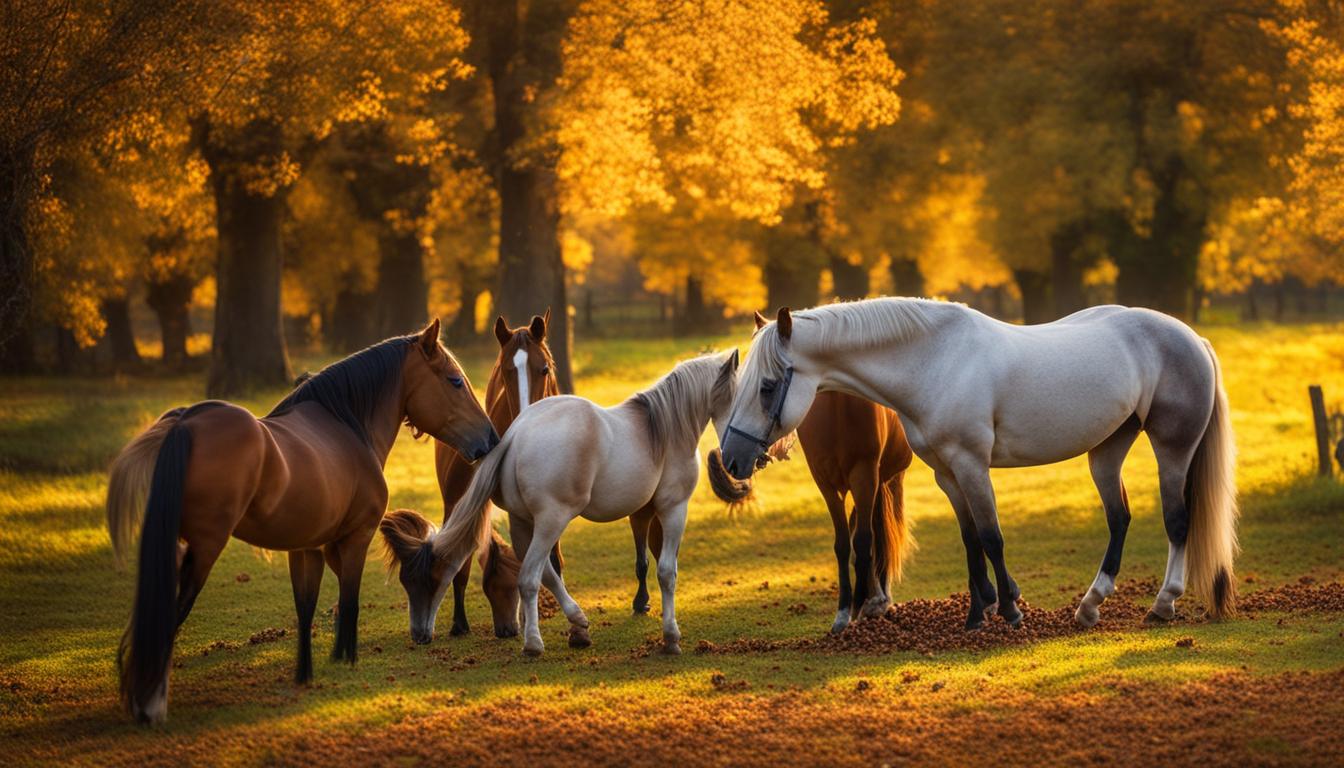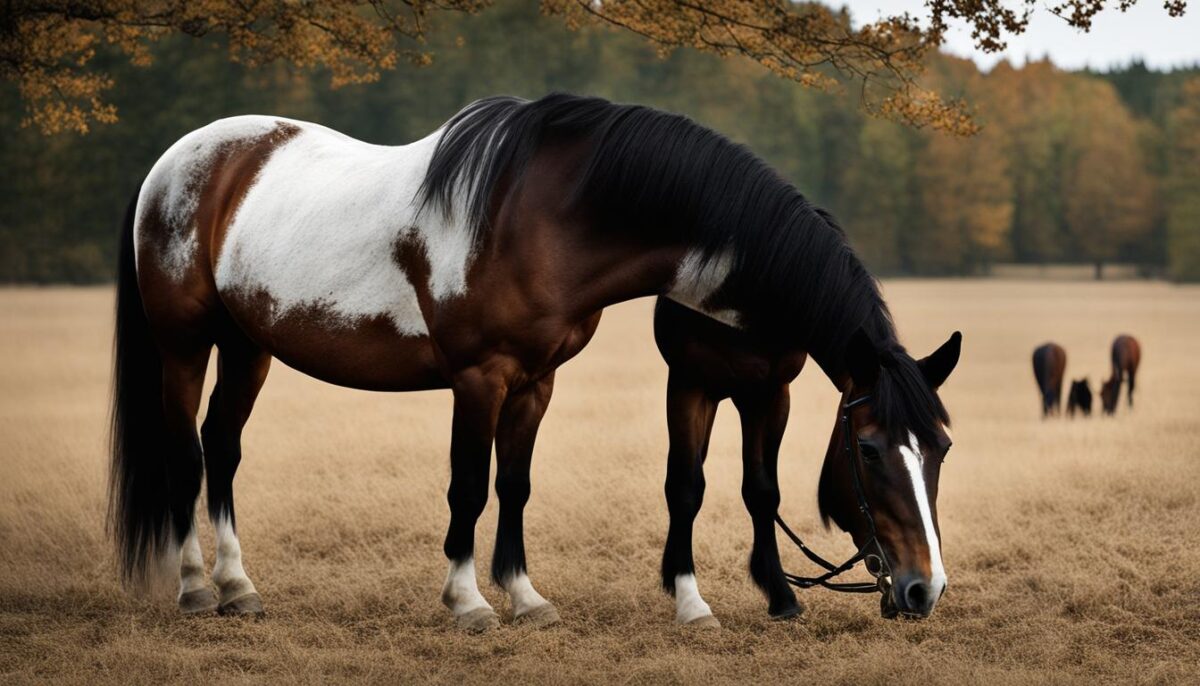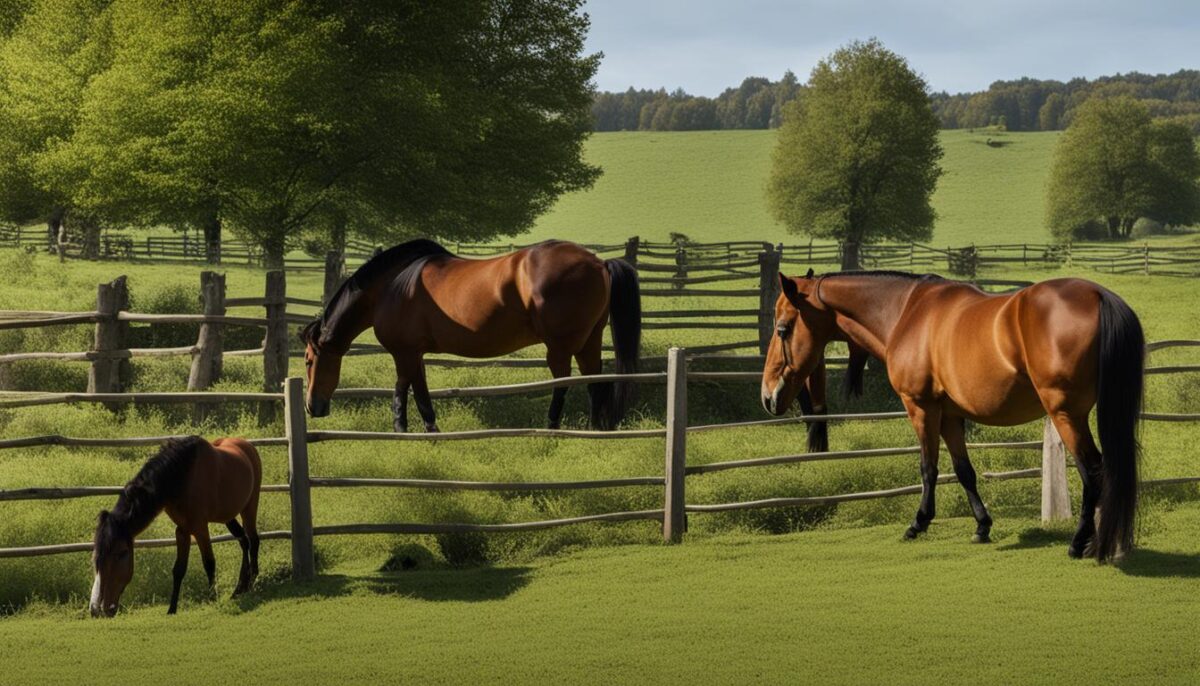Are you wondering if horses can eat acorns? It’s important to know that while acorns may seem tempting to horses, they can actually pose a potential risk to their health. Horses should avoid consuming large quantities of acorns due to the presence of tannic acid, which can interfere with their nutrient absorption and lead to gut and kidney issues. In this article, we will explore the reasons why horses should avoid acorns, the factors that influence their consumption, and how to prevent acorn toxicity in horses.
Key Takeaways
- Acorns can be harmful to horses if consumed in large quantities.
- Tannic acid in acorns can interfere with a horse’s nutrient absorption and lead to gut and kidney issues.
- Symptoms of acorn poisoning in horses include reduced appetite, lethargy, constipation or diarrhea, and signs of dehydration.
- To prevent acorn toxicity, it is important to keep horses from grazing under oak trees and regularly remove fallen acorns from the pasture.
- Offering safe and healthy alternatives like apples, carrots, and oats can divert horses’ attention from acorns and provide a balanced diet.
Why Horses Should Avoid Acorns
Oak acorns and horses do not mix well. While some horses may not have a negative reaction to consuming a few acorns, certain horses are more prone to acorn poisoning, and even a tiny amount can make them sick.
The presence of tannic acid in green acorns can interfere with a horse’s nutrient absorption and potentially lead to gut and kidney issues. This can have serious consequences for a horse’s health. Common symptoms of acorn poisoning include reduced appetite, lethargy, constipation or diarrhea, abdominal pain, and signs of kidney damage or failure.
Recognizing the signs of acorn poisoning is crucial, as prompt veterinary attention is necessary to prevent further complications. If your horse exhibits any of these symptoms or you suspect they consumed acorns, it is important to consult with your veterinarian immediately.
“Even a small amount of acorns can cause toxic effects in horses, so it’s essential to keep them away from consuming these harmful nuts,” says Dr. Sarah Thompson, equine veterinarian.
Horse Health Risks
Acorn poisoning poses several risks to a horse’s overall health. The presence of tannic acid in acorns can disrupt the normal functioning of a horse’s digestive system, affecting nutrient absorption. This can lead to malnutrition, weight loss, and other complications.
The kidneys may also be significantly impacted by acorn toxicity. Tannic acid can cause inflammation and damage to the renal tissues, potentially resulting in kidney failure if left untreated.
Moreover, the symptoms of acorn poisoning, such as reduced appetite and lethargy, can further compromise a horse’s well-being. Timely intervention is crucial for a horse’s recovery and overall health.
| Common Symptoms of Acorn Poisoning in Horses | Signs of Kidney Damage/Failure |
|---|---|
|
|
Factors That Influence Acorn Consumption
While most horses do not find acorns appetizing, several factors can influence their likelihood of consuming them. Understanding these factors can help horse owners take preventative measures to minimize acorn consumption and ensure the well-being of their equine companions.
One significant factor that can contribute to horses eating acorns is boredom. When horses are bored or lack stimulation, they may resort to “boredom eating,” which involves consuming non-nutritious or harmful substances such as acorns. Providing horses with plenty of mental and physical exercise, as well as access to better-tasting alternatives like high-quality grass, grain, or hay, can help prevent them from turning to acorns as a source of entertainment.
Additionally, overgrazed paddocks and reduced grazing quality can increase the likelihood of horses grazing on acorns. If the available grazing land is overused or lacks adequate nutritious grass, horses may be more inclined to seek out alternative food sources, including acorns. Proper pasture management, such as rotational grazing and regular fertilization, can help maintain healthy grazing conditions and reduce the likelihood of horses relying on acorns as a food option.
Furthermore, young horses may be more curious and prone to experimenting with new and interesting food. The novelty of acorns can attract their attention, and they may end up overeating these potential toxins. Monitoring young horses closely, especially when introducing them to new environments or pastures, can help prevent them from developing an acorn addiction or consuming acorns in excessive amounts.
By taking into account these factors and implementing appropriate preventative measures, horse owners can safeguard their animals from acorn consumption and potential health risks.
Evidence of Acorn Consumption:
“My horse, Daisy, developed a peculiar habit of munching on acorns whenever she had nothing else to do. It became apparent to me that she resorted to this behavior out of boredom. To address the issue, I introduced various enrichment activities and made sure she always had access to high-quality hay.”
| Horse Grazing Habits | Acorn Addiction | Boredom Eating |
|---|---|---|
| Some horses may graze on acorns when bored or lacking better-tasting alternatives. | Excessive consumption of acorns can lead to horses developing a dependency or addiction. | Horses may resort to eating acorns out of boredom, seeking a source of entertainment. |
| Overgrazed paddocks and reduced grazing quality can increase the likelihood of horses eating acorns. | Horses, especially younger ones, may be curious about acorns and experiment with overeating. | Understanding these factors can help horse owners minimize the risk of acorn consumption. |
Preventing Acorn Toxicity in Horses
The most effective approach to preventing acorn poisoning in horses is through proactive management. By implementing acorn safety measures and practicing proper pasture management, you can ensure the well-being of your equine companion and maintain a healthy equine diet.
Preventing Grazing Under Oak Trees
Grazing horses should be prevented from accessing areas under oak trees, especially during the autumn months when acorns are dropping. These fallen acorns pose a significant risk to horses due to their high tannic acid content. Fencing off the branch span of the tree can effectively restrict horses’ access to fallen acorns and reduce the chances of acorn consumption.
Regularly Removing Fallen Acorns
Regularly inspecting the pasture and removing fallen acorns is another essential safety measure. Green acorns, in particular, contain higher levels of tannic acid, increasing the risk of acorn toxicity. Removing acorns from the pasture will help minimize exposure and prevent horses from inadvertently consuming them.
Trimming Branches and Keeping Them Out of Reach
To further reduce the risk of acorn poisoning, it’s crucial to keep oak tree branches trimmed and out of reach from horses. This prevents horses from reaching the acorns and eliminates the temptation to consume them. Regularly inspect the trees and trim any overhanging branches to effectively manage the risk.
Providing High-Quality Forage
One of the most effective ways to discourage horses from seeking out acorns as an alternative food source is by providing them with an abundance of high-quality forage. Ensuring that horses have access to nutritious hay or pasture can satisfy their nutritional needs and reduce their inclination to graze on acorns.
| Prevention Measures | Benefits |
|---|---|
| Fencing off grazing areas under oak trees | Restricts access to fallen acorns and reduces the risk of consumption |
| Regularly removing fallen acorns | Minimizes exposure to acorns and decreases the chances of ingestion |
| Trimming branches and keeping them out of reach | Prevents horses from accessing acorns and eliminates temptation |
| Providing high-quality forage | Meets horses’ nutritional needs and discourages grazing on acorns |
Horse-Friendly Alternatives to Acorns
While acorns should generally be avoided in a horse’s diet, there are plenty of safe and healthy alternative treats available. Good-quality hay or access to pasture is usually sufficient to meet a horse’s nutritional needs. However, occasional treats can be given to add variety and divert their attention from acorns.
Healthy Snack Options for Horses
- Apples
- Peaches
- Carrots
- Celery
- Oatmeal
- Melon
- Oranges
- Pears
These horse-friendly alternatives not only provide a delicious snack but also offer nutritional benefits. Apples and carrots, for example, are a great source of vitamins and fiber, while oatmeal can provide energy and aid in digestion.
When providing treats to your horse, it’s important to offer them in moderation. Overconsumption of treats can lead to weight gain and an imbalanced diet. Consult with your veterinarian or equine nutritionist for guidance on appropriate treat portions based on your horse’s age, size, and activity level.
Remember, horses should always have access to fresh water and a balanced diet. Treats should never replace the essential components of their diet.
By offering safe and healthy alternatives to acorns, you can ensure that your horse remains happy and satisfied while avoiding the potential risks of acorn consumption.
Conclusion
Ensuring the safety and well-being of your horse’s diet is crucial for their health. Acorns, while seemingly harmless, can pose a potential risk if consumed in large quantities. It’s important for horse owners to be aware of the potential harms and take preventative measures to protect their equine companions.
To minimize the risk of acorn toxicity, it’s essential to prevent horses from grazing under oak trees. By fencing off the branch span of the trees during autumn when acorns are dropping, you can significantly reduce the chances of your horse consuming them. Regularly removing fallen acorns from the pasture, especially the green ones which contain higher levels of tannic acid, is also crucial in preventing acorn poisoning.
Providing your horse with ample high-quality forage is key to their nutritional needs and can discourage them from seeking out acorns as an alternative. Additionally, offering safe and healthy treats like apples, carrots, and oatmeal can add variety to their diet while keeping them away from potentially harmful acorns.
By taking these preventative measures and prioritizing equine diet safety, you can ensure the health and well-being of your horse. Remember, the happiness and longevity of your horse depend on the choices you make when it comes to their diet. Take proactive steps to prevent acorn toxicity and provide a safe and nutritious diet for your equine companion.
FAQ
Can horses eat acorns?
Acorns can pose a potential risk to horses if consumed in large quantities. While some horses may find acorns enticing, it’s important to understand the potential harms they can cause.
Why should horses avoid acorns?
Oak acorns and horses do not mix well. The presence of tannic acid in green acorns can interfere with a horse’s nutrient absorption and potentially lead to gut and kidney issues.
What factors influence acorn consumption in horses?
While most horses do not find acorns appetizing, certain factors like boredom, lack of better-tasting alternatives, overgrazed paddocks, and curiosity in young horses can increase the likelihood of consumption.
How can acorn toxicity in horses be prevented?
The most effective approach to preventing acorn poisoning in horses is through proactive management, such as preventing horses from grazing under oak trees, regularly removing fallen acorns, and providing ample high-quality forage.
What are some horse-friendly alternatives to acorns?
While acorns should generally be avoided in a horse’s diet, safe and healthy treats like apples, peaches, carrots, and celery can be given in moderation to add variety and divert their attention from acorns.
How can we ensure the health and well-being of horses?
By taking steps to prevent acorn toxicity and providing a balanced diet, we can ensure the health and well-being of horses.


